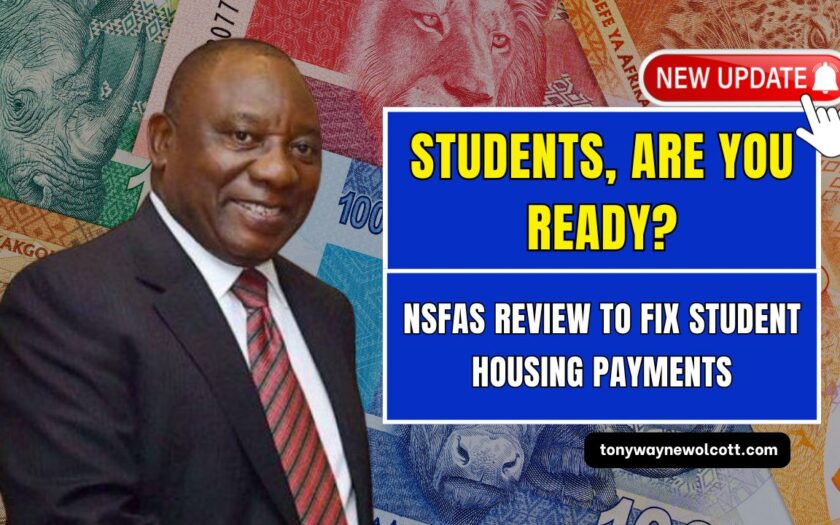The National Student Financial Aid Scheme (NSFAS) is now under a legal review to check how it manages student accommodation and works with third-party partners. This review aims to improve transparency, integrity, and efficiency in the way housing payments are made.
NSFAS says it will follow all recommendations from this review to make sure students get their funds on time, avoid evictions, and live in safe, approved housing.
Why the NSFAS Review is Happening
NSFAS supports thousands of students by paying for their tuition fees and housing. However, in recent years there have been complaints about:
- Late payments to landlords
- Unclear rules for accommodation claims
- Disputes with private housing providers
To fix these issues, NSFAS has started a comprehensive legal review. The aim is to ensure that every payment is handled fairly, records are correct, and housing standards are properly enforced.
NSFAS Statement on Payments
NSFAS has explained that payments are made only when claims pass validation (checking the claim is correct) and verification (confirming the details are true).
Payments may be delayed if:
- The student is not yet funded
- The institution has not confirmed the claim
- The student’s registration data is late
NSFAS also made it clear that it does not owe the R62 million claimed by the Private Housing Student Association (PHSA) for unpaid rent from January 2024 to July 2025. Payments go directly to landlords, not to PHSA, and PHSA has not provided a full list of outstanding claims.
Concerns Raised by PHSA
The PHSA represents many private housing providers. Its CEO, Kagisho Mamabolo, says:
- Thousands of students are in uncertain situations because of payment delays
- Many landlords risk losing money, which may force them to reduce available student housing
- Inconsistent accreditation rules, conflicting university policies, and an extra 5% NSFAS levy charged by intermediaries are adding confusion and costs
These issues make it harder for students to find affordable and reliable accommodation.
Payments Made So Far
Despite the challenges, NSFAS reports that in April 2025, it paid R744,406,752 to landlords to reduce arrears. Funding is still available, and NSFAS continues to pay valid claims.
However, delays still occur because of:
- Students living in accredited properties but not yet funded
- Students at schools not part of the pilot program
- Invoice mistakes or missing details
- Students receiving transport allowances while living in housing
- Properties marked as high quality but not meeting required standards
- Data upload portal problems, which stopped registration data from being processed on time
These issues have led to some students facing evictions when landlords don’t receive payments.
Common Reasons for Delayed NSFAS Housing Payments
| Reason | Explanation |
|---|---|
| Student not funded yet | NSFAS cannot pay until funding is officially approved |
| Institution not in pilot program | School is not part of the new housing payment system trial |
| Invoice errors | Billing documents have mistakes or missing information |
| Transport allowance mix-up | Student gets transport funds while living in housing |
| Incorrect accreditation | Property listed as high standard but fails safety/quality checks |
| Data portal problems | System shutdown delays registration data submission and payment processing |
How NSFAS Plans to Fix the Problem
NSFAS says it will:
- Work closely with universities and landlords to fix errors faster
- Use the legal review’s advice to improve payment processes
- Improve the accreditation system to ensure only safe and standard-compliant housing is approved
- Reopen and improve the data upload portal to avoid future delays
The NSFAS legal review is a major step toward making student housing payments fairer, faster, and more reliable. By addressing late payments, accreditation confusion, and data system problems, NSFAS aims to protect students from eviction and ensure they have safe, standard-approved housing.
With over R744 million already paid in April, the focus is now on fixing the remaining issues so every student gets the housing support they need without delays or uncertainty.
FAQs
Why is NSFAS being reviewed?
It’s to check and improve how student accommodation payments are managed, ensuring fairness and faster service.
Who gets the payments?
NSFAS pays landlords directly, not housing associations, and only for approved and verified claims.
Can payment delays cause evictions?
Yes, in some cases. NSFAS is working with schools and landlords to stop students from being evicted.
